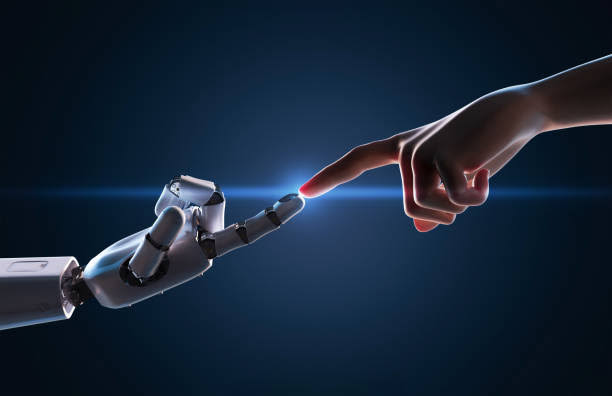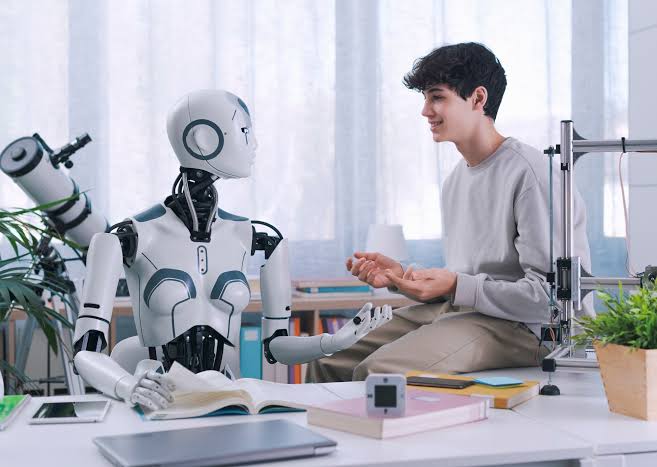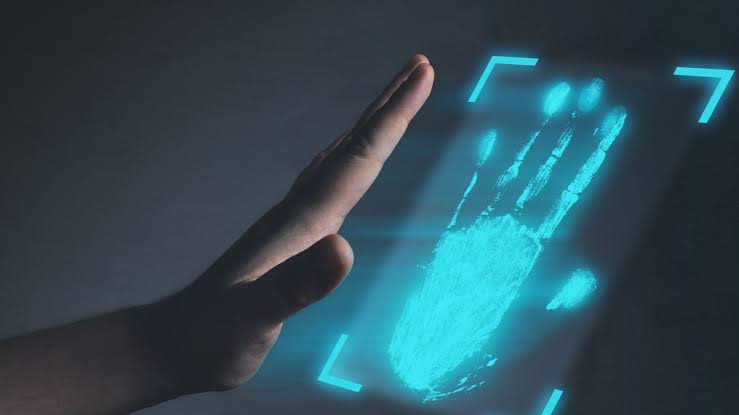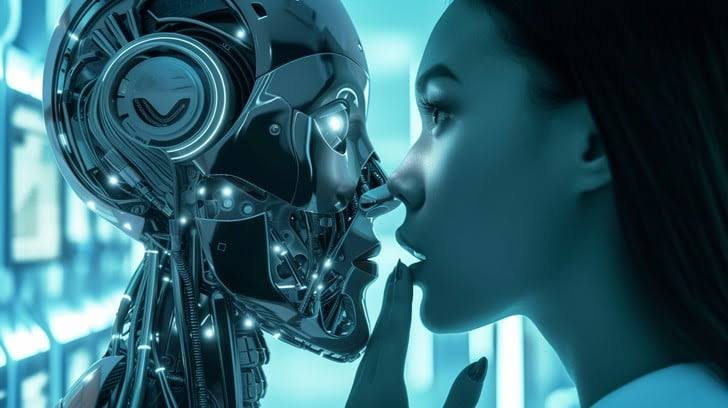Tech But No Touch: Is AI Disrupting Human Intimacy?

INTRODUCTION: Loving in the Age of Algorithms
Imagine this: A young man sits alone in his apartment after a long day. He’s not texting a friend or calling a partner. Instead, he’s confiding in EVA, his AI-powered chatbot. She listens without judgment, responds with empathy, and even remembers his favorite comfort food. He feels heard, maybe even loved.
In a world where human connection is messy and unpredictable, technology offers a version that feels cleaner, faster, and safer. But in making it easier to “connect,” has it quietly made it harder to truly be close?
The question is no longer if AI is disrupting human intimacy, but how deeply.
As AI learns more about our emotional patterns, what happens to the unpredictable, vulnerable, and beautifully flawed nature of human relationships?
Defining AI's Role In Human Connection
Artificial Intelligence (AI) is no longer confined to the labs of Silicon Valley or the screens of sci-fi thrillers. Today, it’s in our homes, our pockets, and increasingly, our hearts.
At the most basic level, AI refers to machines programmed to mimic human intelligence. But beyond crunching data or completing tasks, AI is now venturing into emotional terrain. It's helping people find dates, simulate companionship, and even soothe loneliness.
Across Africa and the globe, we see growing examples of AI mediating our emotional lives:
AI-powered dating platforms like Tinder, Bumble, and TrulyMadly use machine learning to match users based on behavior, preferences, and proximity.

Photo Credit: AzoAi
Emotional companion apps like Replika offer round-the-clock conversations. Marketed as “AI friends who care,” they promise connection without the messiness of human dynamics. For some users, especially those battling anxiety or isolation, it feels safer than real relationships.
Voice assistants like Siri, Alexa, or Google Assistant are no longer just setting alarms. They’re reading bedtime stories to children, reminding elders to take their meds, and responding with light sarcasm or warmth to imitate emotional intelligence.
In these everyday interactions, AI is quietly redefining the meaning of companionship and availability. When people turn to machines for emotional support, one has to wonder:
Are we using technology to enhance our humanity or to escape it?
And in the quest for frictionless communication, are we losing the very friction that makes intimacy authentic?
The Promise: Easier Connection, Instant Companionship
In an increasingly digital world, AI has emerged as both a bridge and a balm for those seeking love, friendship, or simply someone to talk to. For many, the appeal lies not just in efficiency, but in emotional accessibility.
More Options, Less Awkwardness
Dating apps powered by AI like Tinder, Bumble, and OkCupid don’t just match users based on proximity or photos. They now analyze behavior patterns, swiping history, even tone in chat messages, to suggest more “compatible” partners.
For people with social anxiety or neurodivergence, AI removes the pressure of real-time emotional labor, filling a real emotional gap.
Mental Health Support: Not a Cure, But a Crutch
AI-based chatbots are also being used in mental health apps to help users manage anxiety, track moods, and practice cognitive behavioral techniques. They’re not replacements for professionals, but for many, they’re the only affordable option. In Africa, where the average ratio of psychologists is 1 per 500,000 people, tools like these, when accessible, offer early intervention and emotional relief. Connection is not without complexity. For all the benefits of instant companionship, what happens when the line between real and artificial begins to blur?
The Cost: Simulated Intimacy Vs. Real Connection
In a world where AI is always available, always attentive, and never argues, real relationships start to feel complicated. This is the quiet trade-off of tech-enhanced intimacy: emotional comfort without emotional effort.

Photo Credit: Avixa Exchange
Emotional Outsourcing: When Algorithms Become Therapists. Instead of calling a friend, many now turn to AI for comfort and rely on machines for a connection that should come from human relationships.
The Illusion of Connection: The convenience of instant AI companionship can give us the feeling of intimacy without the work it demands, and create that false illusion that many think they connect with.
A 2023 MIT Technology Review article described how AI has started to alter human relationships to the point of losing interest in real relationships. While this may sound extreme, it reveals how the low-friction nature of AI relationships can lower our tolerance for real-world messiness, where people aren’t programmable and emotions aren’t neatly packaged.
Psychosocial Risks: Decline in Intimacy Skills: Overdependence on simulated empathy could dull our relational muscles, skills like active listening, patience, empathy, or dealing with rejection.
AI offers companionship without challenge, depth, or vulnerability and while that feels easy, it can quietly erode the very muscles that make human intimacy meaningful.
Sex Tech & Emotional AI: The New Frontier
We’ve entered a time where intimacy doesn’t always require another human being. From AI-driven sex toys to virtual companions and synthetic lovers, technology is not just reshaping how we connect, but redefining who we connect with.
Love Without Limits? Or Without Layers?
Sex tech, an industry with products that include AI-enabled sex dolls, smart vibrators that adapt to mood or rhythm, and virtual relationship simulators that learn emotional cues. These technologies don’t just provide pleasure, they provide presence. They do the right things. They adapt. They never leave.
But at what cost?
Will humans begin to expect their partners to behave like perfect algorithms?

Photo Credit: StockCake
Empowering or Isolating?
Some argue sex tech is revolutionizing autonomy, especially for marginalized communities, allowing exploration of pleasure and companionship in safe, controlled environments.
Others fear it’s reinforcing loneliness disguised as liberation. If connection becomes programmable, do we lose something essential about what it means to be human?
As AI crosses into intimate territory, we must ask:
Are we building technology to enhance our connections or to replace them altogether?
Young People & The Loneliness Paradox
In a world overflowing with DMs, dating apps, and AI companions, young people have never been more connected, yet never felt more alone.

Photo Credit: 123rf- Google Image
Studies confirm what many silently feel: Gen Z is the loneliest generation in human history. A 2021 survey by Cigna revealed that nearly 61% of young adults (18–25) reported feeling “serious loneliness,” despite spending hours daily online.
Always Online, Rarely Fulfilled
Social media platforms promise community, yet often deliver comparison. Dating apps offer endless matches, yet few meaningful connections. AI chatbots and digital friendships simulate presence, but cannot replace genuine human warmth.
When AI Becomes a Crutch
Young people increasingly turn to AI-based companionship not just for convenience, but for emotional support. These platforms provide comfort, conversation, and attention, without judgment or rejection, but they also deepen the dependency loop.
The loneliness paradox lives here: infinite interactions, but shrinking connection. A world where we’re surrounded by noise, but starved of depth. Constantly seen, but rarely understood.
Can AI Complement not Replace Intimacy?
As AI technology advances, the conversation doesn’t have to be about replacement, but about reinforcement. Artificial intelligence doesn’t need to rob us of our human bonds; it can help us understand them better if we use it with intention.
From Sabotage to Support: When used mindfully, AI can become a powerful companion tool for emotional growth and relationship enrichment:
Therapy Bots:AI can offer 24/7 mental health support using cognitive behavioral therapy techniques without replacing licensed therapists.
Relationship Coaching Apps: AI-driven platforms can help couples communicate better and understand conflict patterns.
Love Language Learners: Some apps now use machine learning to detect and recommend communication styles that align with a partner’s emotional needs.
These demonstrate that AI can amplify our capacity for empathy, reflection, and connection when designed to augment, not automate, emotional labor.
“AI should not be the hand we hold instead of a person, but the light that helps us find our way back to one.”
Because real intimacy isn’t always convenient or curated—it’s raw, unpredictable, and deeply human. And no algorithm, no matter how advanced, can replicate that entirely.
CONCLUSION: Keep the Human in the Loop
Artificial intelligence is here, and it’s not leaving. From dating apps to therapy bots, AI is reshaping how we connect and communicate. But while it may optimize the process, it cannot replicate the purpose of human intimacy: to be seen, heard, and held, not just analyzed, mirrored, or managed.
As we navigate a world increasingly filtered through algorithms, the challenge is not to reject technology, but to anchor ourselves in the emotional truths that machines can’t mimic empathy, vulnerability, nuance, and imperfection.
Let AI help us find each other. But let it never replace each other.
“In a world of perfect algorithms, the most radical thing we can do is be messy, vulnerable, and human.”
You may also like...
Bundesliga's New Nigerian Star Shines: Ogundu's Explosive Augsburg Debut!

Nigerian players experienced a weekend of mixed results in the German Bundesliga's 23rd match day. Uchenna Ogundu enjoye...
Capello Unleashes Juventus' Secret Weapon Against Osimhen in UCL Showdown!

Juventus faces an uphill battle against Galatasaray in the UEFA Champions League Round of 16 second leg, needing to over...
Berlinale Shocker: 'Yellow Letters' Takes Golden Bear, 'AnyMart' Director Debuts!

The Berlin Film Festival honored
Shocking Trend: Sudan's 'Lion Cubs' – Child Soldiers Going Viral on TikTok

A joint investigation reveals that child soldiers, dubbed 'lion cubs,' have become viral sensations on TikTok and other ...
Gregory Maqoma's 'Genesis': A Powerful Artistic Call for Healing in South Africa

Gregory Maqoma's new dance-opera, "Genesis: The Beginning and End of Time," has premiered in Cape Town, offering a capti...
Massive Rivian 2026.03 Update Boosts R1 Performance and Utility!

Rivian's latest software update, 2026.03, brings substantial enhancements to its R1S SUV and R1T pickup, broadening perf...
Bitcoin's Dire 29% Drop: VanEck Signals Seller Exhaustion Amid Market Carnage!

Bitcoin has suffered a sharp 29% price drop, but a VanEck report suggests seller exhaustion and a potential market botto...
Crypto Titans Shake-Up: Ripple & Deutsche Bank Partner, XRP Dips, CZ's UAE Bitcoin Mining Role Revealed!

Deutsche Bank is set to adopt Ripple's technology for faster, cheaper cross-border payments, marking a significant insti...
